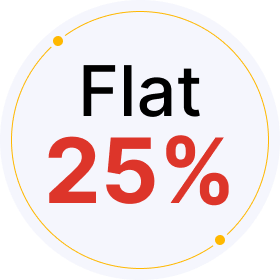
- Blockchain Council
- December 02, 2024
Artificial Intelligence (AI) is changing the game for influencer marketing, giving brands fresh ways to reach their audience. By taking on repetitive tasks and introducing virtual influencers, AI boosts both the efficiency and creativity of marketing efforts.
What AI Brings to Influencer Marketing
AI in this field means using smart tech to simplify tasks like finding the right influencers, studying audience data, and even generating new content. This mix of AI and marketing lets brands make decisions based on real data, ensuring campaigns truly connect with their intended viewers.
The Certified Artificial Intelligence (AI) Expert™ certification equips you with the skills to optimize AI in areas like influencer marketing.
How AI Works in Influencer Marketing
AI is a big help in influencer marketing by managing several key parts:
- Finding Influencers: AI tools can scan massive datasets to find influencers whose followers match a brand’s target audience. This means collaborations are more likely to hit the mark with the right people.
- Creating Content: AI doesn’t just identify trends. It also helps generate engaging content by picking up on what audiences are into. Influencers then have an easier time producing content that strikes a chord with their followers.
- Tracking Results: AI reviews campaign data on the spot, giving insights into things like engagement rates, reach, and return on investment (ROI). This quick feedback lets brands tweak their strategy as needed.
Real-Life Examples
Several brands have taken AI on board to improve their influencer marketing:
- Burger King’s Customized Whopper Campaign: Burger King rolled out a “Million Dollar Whopper” campaign using an AI-powered site where people could design their dream burgers. With influencers promoting this fun, interactive platform, the brand successfully combined tech with influencer power, pulling in a larger crowd.
- Heinz’s Unique Ketchup Designs: Heinz turned to AI for creative ketchup bottle designs that went into both online and offline ads. They encouraged fans on social media to share their own AI-made designs, building a sense of community around the brand.
- GuideGeek’s AI Travel Tool: GuideGeek, an AI travel planner, teamed up with influencers who showcased the tool’s strengths. Influencers planned trips with GuideGeek, sharing their journeys with followers and demonstrating how helpful AI can be in travel planning.
Notable AI Influencers
- Lil Miquela: Lil Miquela, a virtual influencer powered by AI, has gathered over 2.5 million followers on Instagram. This digital personality has partnered with big brands like Calvin Klein and Samsung, showing how AI-created personas can be powerfully effective in marketing.
- Kuki AI: Kuki, an AI created by ICONIQ AI, has made waves by appearing in Vogue Business and participating in Crypto Fashion Week. Acting as a model for NFTs and discussing the future of digital fashion, Kuki is redefining what virtual influencers can bring to the fashion industry.
As AI becomes essential in influencer marketing, becoming a Certified Prompt Engineer™ could make a real difference in campaign effectiveness.
AI in Campaign Oversight
AI is also a great tool for handling influencer campaigns from start to finish. AI-powered platforms can analyze huge amounts of data to find influencers whose audience matches a brand’s ideal customer. This means collaborations are more targeted and feel genuine.
Example: Dreamwell AI
Dreamwell AI, a startup co-founded by Kazzy Khazaal and Anthony Bobsin, aims to automate a large chunk of influencer marketing tasks using AI. Their platform picks out possible influencers, assesses their fit, and sets up the campaign, making things smoother for brands.
Boosting Content Creation
AI is useful in content creation, too. It suggests ideas, drafts content, and even helps with editing, keeping influencers and brands on track with fresh, appealing content.
Taking the Master AI Learning Path could help you learn how to use AI for more successful influencer campaigns.
Example: Castmagic
Castmagic is an AI tool that allows users to turn audio or other media into text-based content. This tool simplifies the content process, enabling influencers to create varied content quickly.
Analyzing the Audience
To succeed in influencer marketing, brands need to know their audience well. AI digs through audience data, showing brands the behaviors and interests that matter, allowing campaigns to be tailored to suit their followers.
Example: Sprout Social’s Tagger
Sprout Social’s platform, Tagger, uses AI to study trends and audience data, helping brands come up with strategies that are rooted in data and matching influencers with audiences that fit.
Tackling Fraud in Influencer Marketing
Fake followers and engagements are real problems in influencer marketing. AI helps detect these by examining certain behaviors. Reports show that as AI tools improved, cases of influencer fraud dropped, giving brands more confidence in authentic engagement.
The Certified Artificial Intelligence (AI) Developer™ credential equips you with practical skills to build AI solutions that boost influencer marketing results
Benefits of AI in Influencer Marketing
Using AI in influencer marketing comes with several perks:
- Saving Time: AI handles repetitive tasks like finding influencers and tracking results, allowing marketers to focus more on planning and creativity.
- Precision in Targeting: With data-backed insights, brands can pick influencers who closely match their audience, making campaigns more effective.
- Growing with Ease: AI tools can juggle multiple campaigns at once, making it easier for brands to expand their influencer efforts.
Challenges and Ethical Questions
While AI is a game-changer, it raises some ethical points to consider:
- Keeping Things Real: Virtual influencers created with AI may stretch the definition of authenticity. Brands need to find a balance between tech innovation and genuine engagement to keep consumer trust.
- Openness with Audiences: Brands should be transparent when using AI, especially in marketing, to ensure they’re honest with consumers.
- Ethics in AI Use: There are concerns that AI-generated influencers could set unrealistic standards, such as beauty ideals. For example, the “Miss AI” beauty pageant sparked criticism for potentially pushing unrealistic looks.
Our Unlimited Learning Subscription gives you access to continuous AI learning, helping you stay updated on the latest tools in influencer marketing.
Final Thoughts
As AI keeps advancing, its role in influencer marketing will likely keep growing. Brands will continue using AI to improve efficiency and creativity. Yet, while AI brings a lot of positives, it also calls for a thoughtful approach to keep marketing both ethical and effective.


































































 Guides
Guides News
News Blockchain
Blockchain Cryptocurrency
& Digital Assets
Cryptocurrency
& Digital Assets Web3
Web3 Metaverse & NFTs
Metaverse & NFTs
